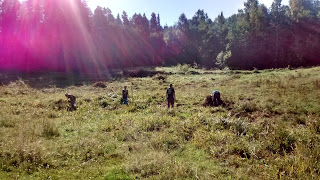 |
| Uncultivated Nenets in the North |
I imagined something like that whilst I worked on the properties of the Valaam monastery, up North of Saint Petersburg. Chopping wood on a small island, about two hours from the mainland, I could perfectly imagine the local monks literally cultivating the land. However, there were so many churches that not all churches on the island could possibly fulfil the role of outpost. I looked it up, and these 'sketes' facilitate both isolation and communal services. Besides a church or chapel, there's living space for monks - whether it cells or a cave. There isn't quite much of en mass masses going on in these sketes, but there's always monks who perform service. With only the act of service, they praise the higher being, I guess.
A monk and a chapel ... or a hermit in a cave.
I volunteered on the Valaam archipelago, spread out in the Northern part of Lake Ladoga, the biggest lake of Europe, right at the border of Finland. The islands were moving back and forth between Finnish and Russian hands, but have always been Orthodox. Frontiers between nations in empires like the Swedish and the Russian were unclear. In time the Russians took the Duchy of Finland from the Swedish empire, and Valaam as well. The island and monastery were part of Finnish independence in 1917, however. Eventually, they ended up in Russian hands again , after the Finno-Russian Winter War in the fourties.
 |
| A skete that looks rather Finnish |
The work I was doing wasn't work, technically. It was called poslushaniye - which can be translated as penance, obedience, submission and more like that. Sin is a quite central concept in Orthodoxy, and I contemplated if purgatory is an easier way out.
There was quite a lot of time to think. Lumber-jacking, collecting potatoes, cleaning up stables and beaches - it sometimes felt like a work camp. We ate buckwheat and fish soup from metal bowls, with a spoon only. Accommodation was simple, with no warm water and no toilet doors. And labour was physical and for free, but no slavery for sure.
Indeed, labour camps are no anachronism. Even though the GULAG doesn't exist any more, penal colonies live on. Convicts are still send to inhospitable places in the North and East of Russia. I have no idea to what extend they look like Valaam. The nature might be as stunning, the work might be worse. Food and isolation are probably similar.
 |
| Collecting wood |
 |
| There's more churches to build. |
In Orthodox churches, ritual is more important than theology. Contrary to Western church, sermon and Bible reading aren't as central as singing and praying. The gender roles are quite striking. It's both women and men who are veiled in Orthodox surroundings. On church properties we wore trousers and long sleeves - the women long skirts and head-scarfs. In church, the women were standing at the left, the men right.
The island didn't seem to have a food culture. There was no chatting, just hurry. There's something with morning porridge with kompot, however. After work, there was always time for tea. We made potato pancakes with smetana, and raw garlic or horse radish could spice anything up. In the end, I will miss the omnipresent cats, the real banya, the cold lake swims, and the Russian club dancing.
Sunday morning mass






Geen opmerkingen:
Een reactie posten